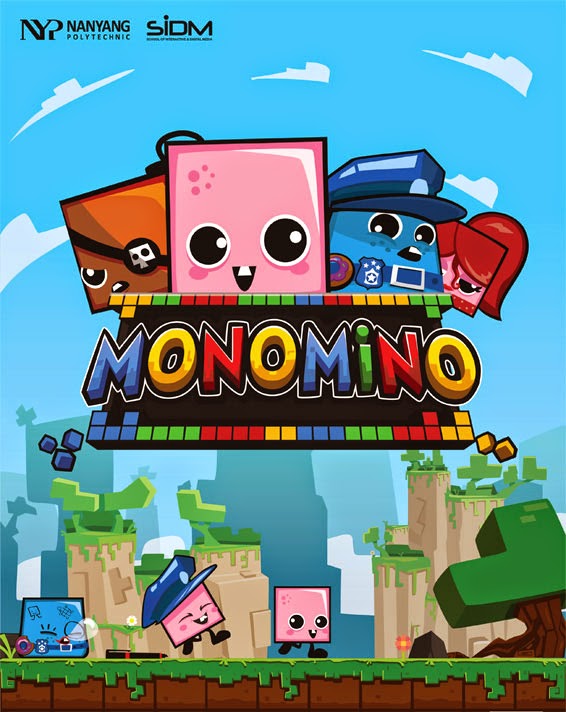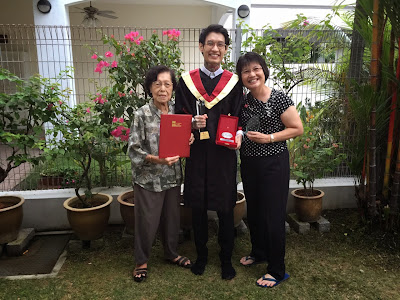Monomino � Turning Great Ideas a Reality
Monomino is a made-in-NYP indie PC game that was recently launched on Steam. This game was developed by students and staff from NYP�s School of Interactive and Digital Media (SIDM), and it is the first indie commercial game to be produced by the school.
This puzzler requires gamers to help �Minobabies� escape various levels and return home. Players can build paths for the babies using blocks of various shapes and sizes. They can also use power-ups to give the Minobabies special abilities that will allow them to overcome obstacles.
Monomino is the brain child of Yong Xiang, who is currently serving his National Service. Ironically, he did not think much of his own concept, and it took the strong support and encouragement of his classmates and lecturers to turn his idea into the cute, visually-distinctive game it is today.
The Start of a Great Idea
Yong Xiang and Nigel were in Year 2 when their lecturer Philippe Blanchet tasked the class with coming up with a game concept. The duo was brain storming when the basic concept for Monomino came to Yong Xiang - when he was in the toilet.
�The toilet is a good place to think of something,� he said with a laugh, �At first, the idea was to build an �escape� game. But we started to simplify the concept because we didn�t have the experience to create something so big.�
Yong Xiang said he was inspired by Legos and Tetris when he came up with the basic premise for the game, and the 23-year old had never heard or played the 23-year old �Lemmings� game with which it has been compared to.
Ironically, Yong Xiang did not think much of his own idea, but his partner Nigel helped to change his mind. When he discussed the idea with Nigel, he was quite surprised, �Nigel kept telling me this game has potential but I didn�t believe it.�
The Guiding Hand
When Yong Xiang and Nigel pitched the idea to Philippe, he said that he liked the concept and the accompanying artwork that the duo had prepared.
He wasn�t alone.
He said, �We had about 70 students presenting their concepts in class, and this was one of the best because all the game elements were working well together. The presentation was really good, and we also had students vote for their favourite idea. This was one of the top ideas even though everyone in the class liked role-playing games.�
Philippe has been working in the game industry since 1995 and has worked on everything from AAA titles to casual games. He says that it is important for students to break-out of their traditional comfort zones as gamers.
He said, �In the games industry, we are always supposed to make games for everyone, not just ourselves or we will never make money.�
Grinding to Level Up
With the basic concept nailed down, Monomino became one of four games that SIDM would develop into a full-blown Final Year Project with more students being pulled into the development of the game.
Even exchange students from the prestigious French videogame school, Supinfogame , contributed to development of this game.
A look at the development cycle of Monomino and the students and staff who contributed to the game:
Students
2013 / Q1
Ng Yong Xiang | Digital Media Design (Games)
Muhammad Hata B Musa | Digital Entertainment Technology (Games)
Lim Wei Teng | Digital Entertainment Technology (Games)
2013 / Q2
Chng Jing Qiang Nigel | Digital Media Design (Games)
Lim Wei Teng | Digital Entertainment Technology (Games)
Ophelie Schlichting | Supinfogame
2013 / Q4
Park Seong Eun | Digital Media Design (Games)
Ng Yun Xuan | Digital Media Design (Games)
Ong Bo Han | Digital Entertainment Technology (Games)
Ong Guang Ming | Digital Entertainment Technology (Games)
2014 / Q1
Royce Lee Xiang Hong | Digital Media Design (Games)
2014 / Q2
Robin Tronchon | Supinfogame
2014 / Q3
Ang Zheng Yang | Digital Entertainment Technology (Games)
Nicodemus Seet | Digital Entertainment Technology (Games)
Staff
Philippe Blanchet
Took care of the production. Managing the teams and supervising the game design
Stanley Haryoto
Supervised the programmers until 2014/Q1 when he started to take care of the relationship with the publishers
Edwin Chua
Supervised the programming after 2014/Q1 and help also by programming himself
Lynette WU
Helped with art bugs after 2014/Q1
Fritz Lim
Produced music for a first prototype
It was a huge learning opportunity for all the students involved. Park Seong Eun, who contributed to the game�s art and character design, said �I like to work these kind of art projects and I learnt how to match the art style.�
It was also a programming boon for Ong Bo Han and Lim Wei Teng . Wei Teng, who is currently working at a marketing company, said, �At the start of the project, I was quite weak in programming � I couldn�t get one feature working. At the end of the project, I learnt how to develop for the Unity game engine and C#.�
Bo Han said, �Because there were a few different student programmers, I learnt how to understand their different coding styles when I had to rewrite some of the parts.�
But the learning experience wasn�t confined to the students. When the students and staff demonstrated the game at various trade shows, it drew the interest of several game publishers, so the SIDM staff had to quickly become experts on the business-side of game distribution.
Philippe said that this was the first time that he worked with a game publisher on distributing the game since he joined SIDM.
Great Lecturers � The IMBA Power-Up
When he reflects on development of Monomino, the once-sceptical Yong Xiang is quick to credit his partner Nigel and his classmates for turning his concept into reality.
But he is especially grateful for Philippe�s guidance. He said, �I had a great lecturer guiding me along. When I present an idea, he won�t tell me what�s wrong immediately. He wants me to figure out what�s wrong by myself first. He has a lot of creative ideas, and he enriches my mind.�
Press Start to Continue
Even though Monomino has been published on Steam, it�s not �Game Over� for the developers. The team is currently working on mobile versions of the game. They are also working on squashing rare and obscure bugs that are reported by users.
And while work on Monomino continues, its developers are already working their own games. Seong Eun says that she is currently working on an interactive visual novel with a friend. The duo of Yong Xiang and Nigel are also working on a new game and hope to start their own game development company in the future.
Mr Daniel Tan, Director for SIDM said, �Congratulations to the team. At SIDM, we encourage our game students to go beyond learning. We want them to believe that if they can dream of a great game, we can help them realized it, even in commercializing it. We look forward to more such examples from our students.�
Monomino is currently available on Steam for PC at SGD$6.50.
This puzzler requires gamers to help �Minobabies� escape various levels and return home. Players can build paths for the babies using blocks of various shapes and sizes. They can also use power-ups to give the Minobabies special abilities that will allow them to overcome obstacles.
Monomino is the brain child of Yong Xiang, who is currently serving his National Service. Ironically, he did not think much of his own concept, and it took the strong support and encouragement of his classmates and lecturers to turn his idea into the cute, visually-distinctive game it is today.
The Start of a Great Idea
Yong Xiang and Nigel were in Year 2 when their lecturer Philippe Blanchet tasked the class with coming up with a game concept. The duo was brain storming when the basic concept for Monomino came to Yong Xiang - when he was in the toilet.
�The toilet is a good place to think of something,� he said with a laugh, �At first, the idea was to build an �escape� game. But we started to simplify the concept because we didn�t have the experience to create something so big.�
Yong Xiang said he was inspired by Legos and Tetris when he came up with the basic premise for the game, and the 23-year old had never heard or played the 23-year old �Lemmings� game with which it has been compared to.
Ironically, Yong Xiang did not think much of his own idea, but his partner Nigel helped to change his mind. When he discussed the idea with Nigel, he was quite surprised, �Nigel kept telling me this game has potential but I didn�t believe it.�
The Guiding Hand
 |
| Back row (from-left) Zheng Yang, Nicodemus, Philippe Blanchet, Bo Han, Edwin Chua. Front row (from left) Yong Xiang, Nigel,-Seong-Eun and Wei-Teng. |
He wasn�t alone.
He said, �We had about 70 students presenting their concepts in class, and this was one of the best because all the game elements were working well together. The presentation was really good, and we also had students vote for their favourite idea. This was one of the top ideas even though everyone in the class liked role-playing games.�
Philippe has been working in the game industry since 1995 and has worked on everything from AAA titles to casual games. He says that it is important for students to break-out of their traditional comfort zones as gamers.
He said, �In the games industry, we are always supposed to make games for everyone, not just ourselves or we will never make money.�
Grinding to Level Up
With the basic concept nailed down, Monomino became one of four games that SIDM would develop into a full-blown Final Year Project with more students being pulled into the development of the game.
Even exchange students from the prestigious French videogame school, Supinfogame , contributed to development of this game.
A look at the development cycle of Monomino and the students and staff who contributed to the game:
Students
2013 / Q1
Ng Yong Xiang | Digital Media Design (Games)
Muhammad Hata B Musa | Digital Entertainment Technology (Games)
Lim Wei Teng | Digital Entertainment Technology (Games)
2013 / Q2
Chng Jing Qiang Nigel | Digital Media Design (Games)
Lim Wei Teng | Digital Entertainment Technology (Games)
Ophelie Schlichting | Supinfogame
2013 / Q4
Park Seong Eun | Digital Media Design (Games)
Ng Yun Xuan | Digital Media Design (Games)
Ong Bo Han | Digital Entertainment Technology (Games)
Ong Guang Ming | Digital Entertainment Technology (Games)
2014 / Q1
Royce Lee Xiang Hong | Digital Media Design (Games)
2014 / Q2
Robin Tronchon | Supinfogame
2014 / Q3
Ang Zheng Yang | Digital Entertainment Technology (Games)
Nicodemus Seet | Digital Entertainment Technology (Games)
Staff
Philippe Blanchet
Took care of the production. Managing the teams and supervising the game design
Stanley Haryoto
Supervised the programmers until 2014/Q1 when he started to take care of the relationship with the publishers
Edwin Chua
Supervised the programming after 2014/Q1 and help also by programming himself
Lynette WU
Helped with art bugs after 2014/Q1
Fritz Lim
Produced music for a first prototype
It was a huge learning opportunity for all the students involved. Park Seong Eun, who contributed to the game�s art and character design, said �I like to work these kind of art projects and I learnt how to match the art style.�
 |
| A tongue-in-cheek look at how the character art evolved over the game's development. |
Bo Han said, �Because there were a few different student programmers, I learnt how to understand their different coding styles when I had to rewrite some of the parts.�
But the learning experience wasn�t confined to the students. When the students and staff demonstrated the game at various trade shows, it drew the interest of several game publishers, so the SIDM staff had to quickly become experts on the business-side of game distribution.
Philippe said that this was the first time that he worked with a game publisher on distributing the game since he joined SIDM.
Great Lecturers � The IMBA Power-Up
When he reflects on development of Monomino, the once-sceptical Yong Xiang is quick to credit his partner Nigel and his classmates for turning his concept into reality.
But he is especially grateful for Philippe�s guidance. He said, �I had a great lecturer guiding me along. When I present an idea, he won�t tell me what�s wrong immediately. He wants me to figure out what�s wrong by myself first. He has a lot of creative ideas, and he enriches my mind.�
Press Start to Continue
Even though Monomino has been published on Steam, it�s not �Game Over� for the developers. The team is currently working on mobile versions of the game. They are also working on squashing rare and obscure bugs that are reported by users.
And while work on Monomino continues, its developers are already working their own games. Seong Eun says that she is currently working on an interactive visual novel with a friend. The duo of Yong Xiang and Nigel are also working on a new game and hope to start their own game development company in the future.
Mr Daniel Tan, Director for SIDM said, �Congratulations to the team. At SIDM, we encourage our game students to go beyond learning. We want them to believe that if they can dream of a great game, we can help them realized it, even in commercializing it. We look forward to more such examples from our students.�
Monomino is currently available on Steam for PC at SGD$6.50.











Comments
Post a Comment